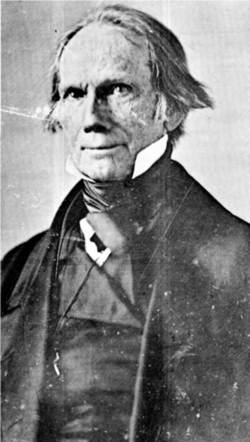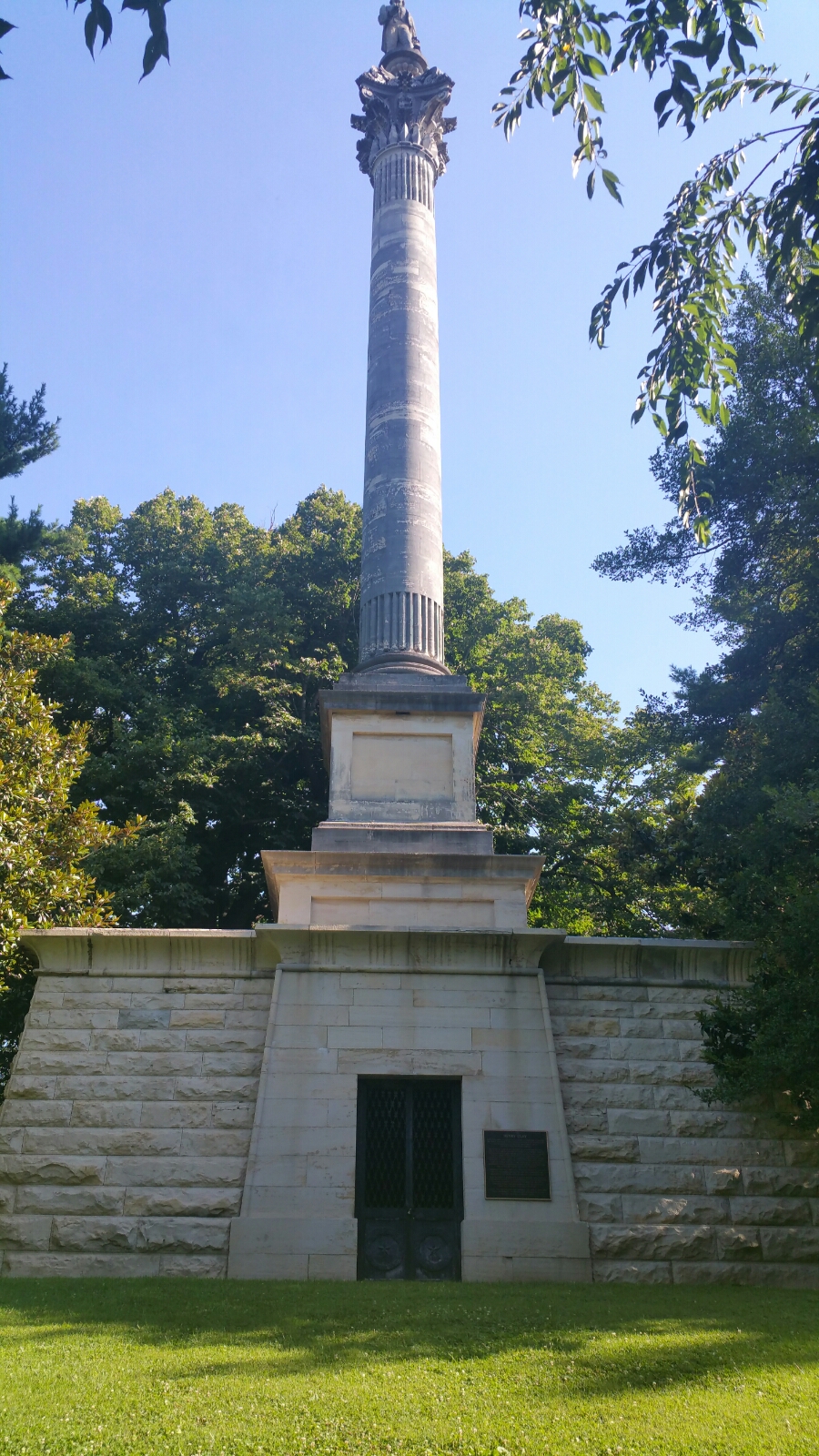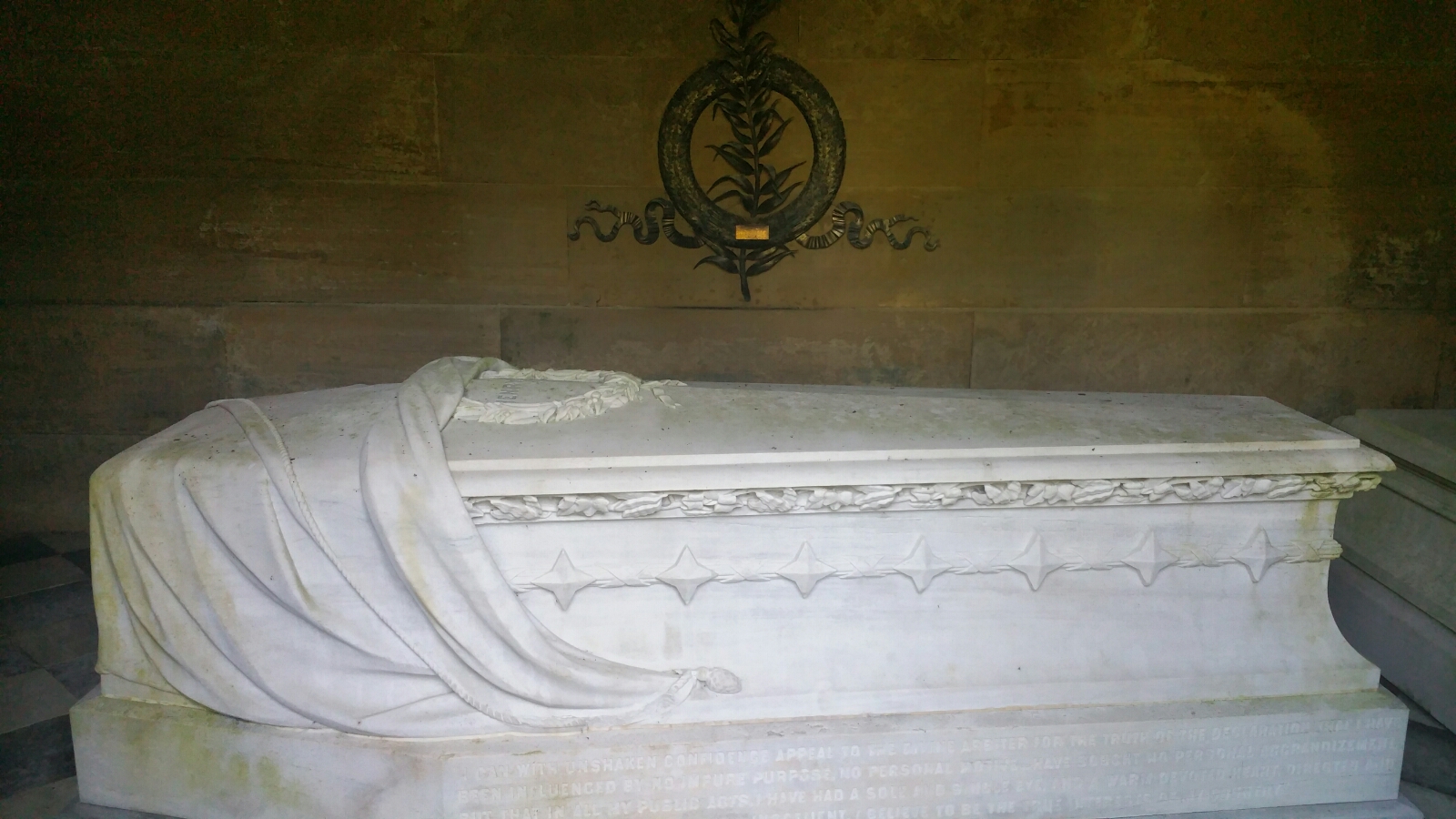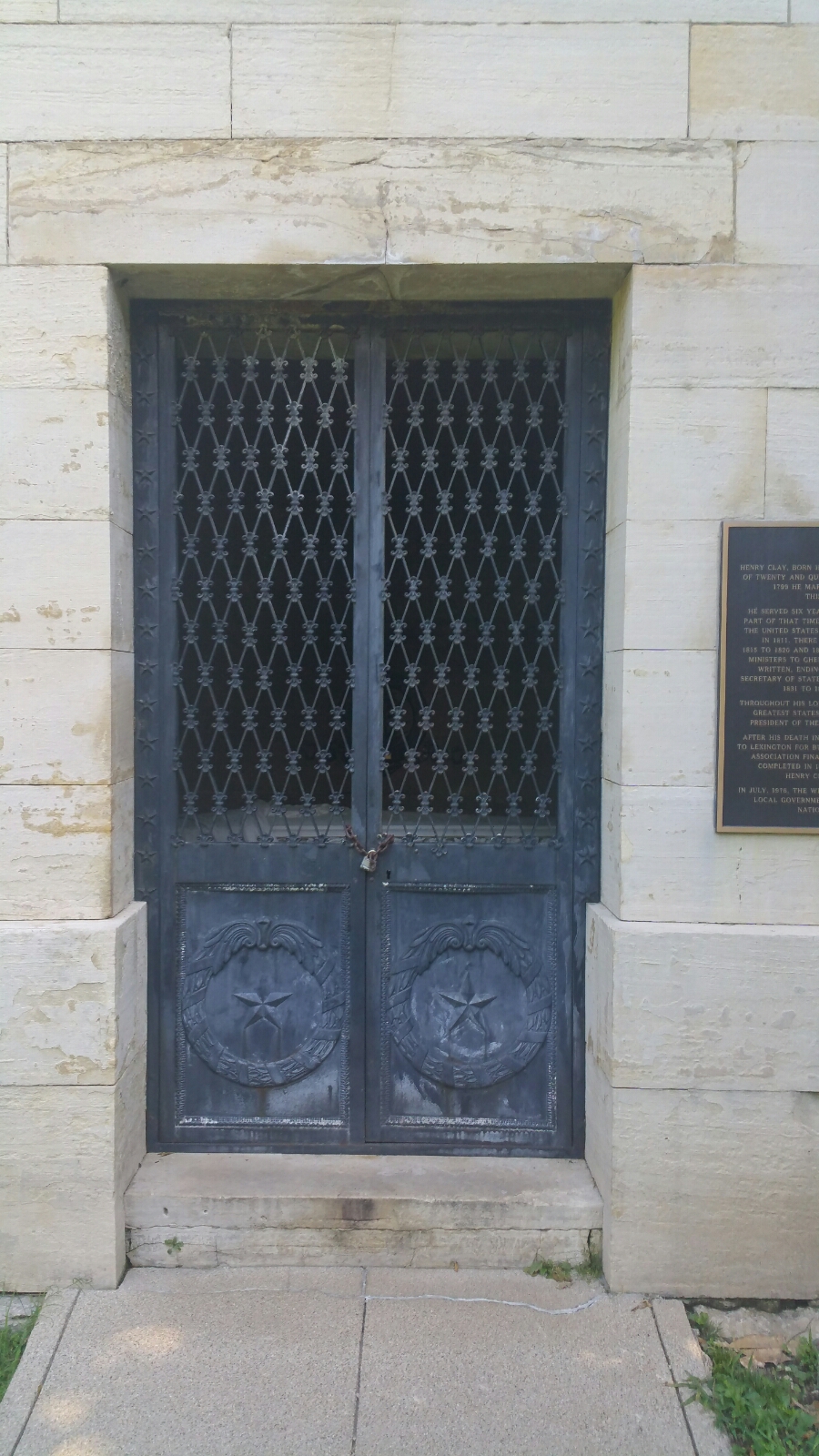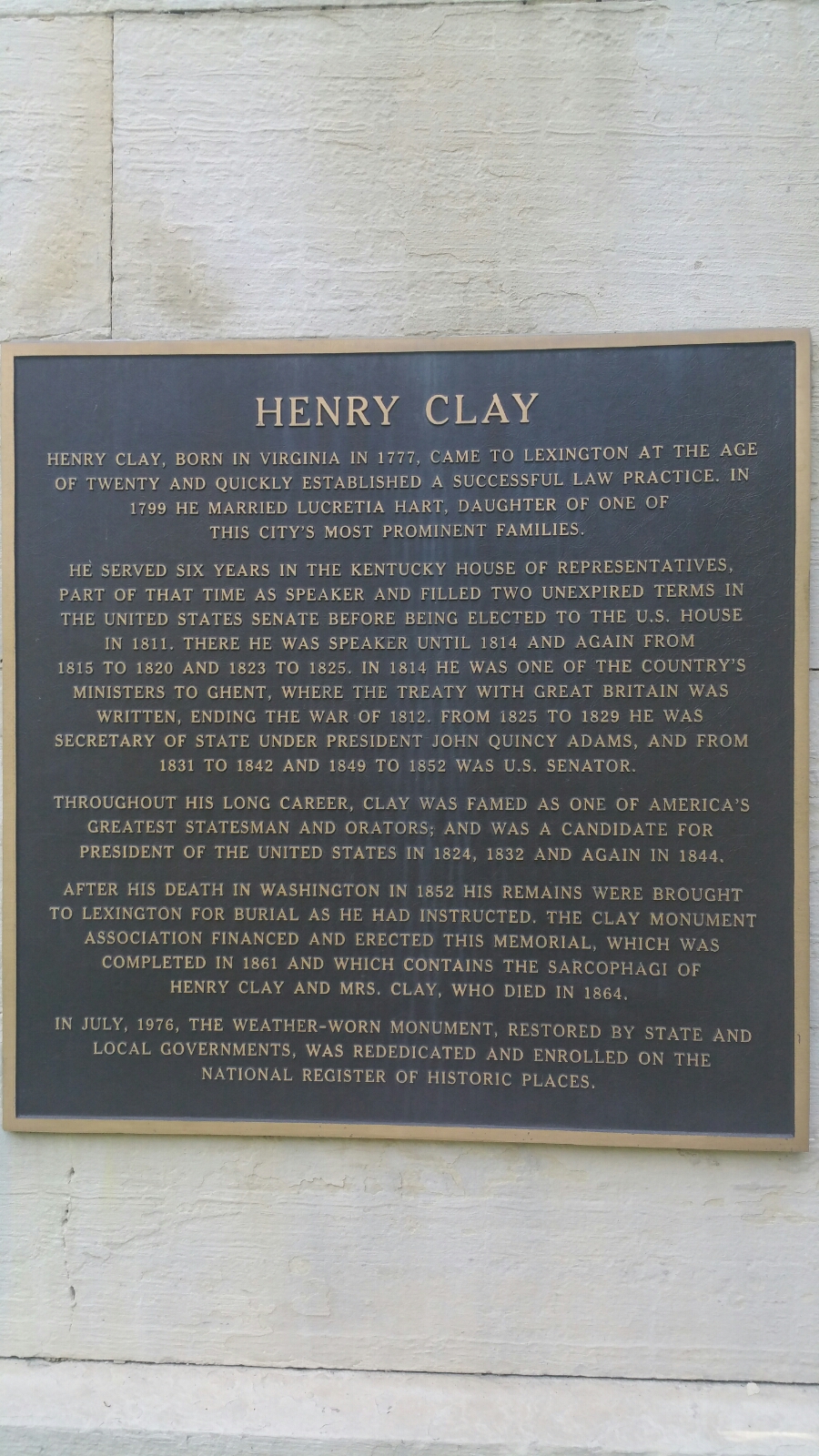U.S. Congressman, U.S. Senator. One of the Founders of the Whig political party, he was known as "The Great Compromiser" for his skillful forging of political compromises between the interests of free states and slave states, thus averting Civil War for several decades. Born the seventh son of nine children in Hanover County, Virginia, he had seen British troops under Colonel Banastre Tarleton ransack his family home. He grew up in the rural slaveholding area of Hanover County, Virginia, which despite the pro-slavery influence of his neighbors, only convinced him that slavery was ultimately doomed as an institution. When his father died in 1781, his mother married Captain Henry Watkins, who used his influence to get young Henry a job as a clerk in Peter Tinsley's chancery office. There he earned his license to practice law in Virginia. At the age of 20, Clay moved to Kentucky, where he soon established a reputation as a highly successful trial lawyer. He married Lucretia Hart, and soon became an established landowner, livestock breeder, and farmer, in addition to being a lawyer. In 1803, he was elected to the Kentucky General Assembly, and, just three years later, he was appointed to fill a vacancy in the U.S. Senate. Elected that same year to the Kentucky House of Representatives, he returned to the U.S. Senate again in 1810, again filling another unexpired vacancy. It was in the U.S. House of Representatives where he would ultimately make his most notable contributions to politics, where he was first elected in 1811; upon his first day as a Congressman, he was elected as Speaker of the House. Although a "War Hawk" when coming to a decision on going to war with Great Britain in 1812, he would serve as a commissioner to the joint British-American peace negotiations in Ghent, Belgium, in 1814, ending the War of 1812. Favoring the end of slavery, he soon was involved in the expansion of free states vs. slave states in the growing west. Desiring to keep the Union together, he orchestrated the "Missouri Compromise of 1820" which provided for some slavery expansion, but more importantly, opened up the West in a more organized fashion, avoiding an early threat of secession by some pro-slavery states. The Compromise of 1820 brought Maine in as a free state and Missouri in as a slave state, thus maintaining an 11-11 balance in Congress, but more importantly, it forbade slavery north of 36 degrees, 30 minutes (the northern border of Arkansas). In 1824, he was appointed Secretary of State under President John Quincy Adams. He ran for President in 1824, 1832, 1840, 1844, and 1848, being defeated each time. Although these attempts were unsuccessful, he defined the issues of the two-party system for over thirty years. In 1849, he returned to the U.S. Senate, where, the next year, he authored the Compromise of 1850, perhaps his most important piece of legislation. The issue was the newly-annexed lands taken from Mexico during the Mexican War of 1846-48. Clay's plan allowed slavery in New Mexico and Utah territories, while admitting California as a free state. It also included a revised Fugitive Slave Act and banned the slave trade in the District of Columbia. This compromise helped to delay the Civil War for another 11 years. Feeling increasingly ill, he resigned from the Senate in 1851, and died the following year in Washington, D.C. He once summed up his life: "If any one desires to know the leading and paramount object of my public life, the preservation of the Union will furnish him the key." His headstone reads: "I know no North, no South, no East, no West."
U.S. Congressman, U.S. Senator. One of the Founders of the Whig political party, he was known as "The Great Compromiser" for his skillful forging of political compromises between the interests of free states and slave states, thus averting Civil War for several decades. Born the seventh son of nine children in Hanover County, Virginia, he had seen British troops under Colonel Banastre Tarleton ransack his family home. He grew up in the rural slaveholding area of Hanover County, Virginia, which despite the pro-slavery influence of his neighbors, only convinced him that slavery was ultimately doomed as an institution. When his father died in 1781, his mother married Captain Henry Watkins, who used his influence to get young Henry a job as a clerk in Peter Tinsley's chancery office. There he earned his license to practice law in Virginia. At the age of 20, Clay moved to Kentucky, where he soon established a reputation as a highly successful trial lawyer. He married Lucretia Hart, and soon became an established landowner, livestock breeder, and farmer, in addition to being a lawyer. In 1803, he was elected to the Kentucky General Assembly, and, just three years later, he was appointed to fill a vacancy in the U.S. Senate. Elected that same year to the Kentucky House of Representatives, he returned to the U.S. Senate again in 1810, again filling another unexpired vacancy. It was in the U.S. House of Representatives where he would ultimately make his most notable contributions to politics, where he was first elected in 1811; upon his first day as a Congressman, he was elected as Speaker of the House. Although a "War Hawk" when coming to a decision on going to war with Great Britain in 1812, he would serve as a commissioner to the joint British-American peace negotiations in Ghent, Belgium, in 1814, ending the War of 1812. Favoring the end of slavery, he soon was involved in the expansion of free states vs. slave states in the growing west. Desiring to keep the Union together, he orchestrated the "Missouri Compromise of 1820" which provided for some slavery expansion, but more importantly, opened up the West in a more organized fashion, avoiding an early threat of secession by some pro-slavery states. The Compromise of 1820 brought Maine in as a free state and Missouri in as a slave state, thus maintaining an 11-11 balance in Congress, but more importantly, it forbade slavery north of 36 degrees, 30 minutes (the northern border of Arkansas). In 1824, he was appointed Secretary of State under President John Quincy Adams. He ran for President in 1824, 1832, 1840, 1844, and 1848, being defeated each time. Although these attempts were unsuccessful, he defined the issues of the two-party system for over thirty years. In 1849, he returned to the U.S. Senate, where, the next year, he authored the Compromise of 1850, perhaps his most important piece of legislation. The issue was the newly-annexed lands taken from Mexico during the Mexican War of 1846-48. Clay's plan allowed slavery in New Mexico and Utah territories, while admitting California as a free state. It also included a revised Fugitive Slave Act and banned the slave trade in the District of Columbia. This compromise helped to delay the Civil War for another 11 years. Feeling increasingly ill, he resigned from the Senate in 1851, and died the following year in Washington, D.C. He once summed up his life: "If any one desires to know the leading and paramount object of my public life, the preservation of the Union will furnish him the key." His headstone reads: "I know no North, no South, no East, no West."
Bio by: Kit and Morgan Benson
Family Members
-
Henrietta Clay
1800–1801
-
![]()
Sarah "Sally" Clay Mead
1801–1897
-
![]()
Theodore Wythe Clay
1802–1870
-
![]()
Thomas Hart Clay Sr
1803–1871
-
![]()
Susan Hart Clay Duralde
1805–1825
-
![]()
Mary Ann Brown "Anne" Clay Erwin
1807–1835
-
![]()
Lucretia Hart Clay
1809–1823
-
![]()
Henry Clay Jr
1811–1847
-
![]()
Eliza Hart Clay
1813–1825
-
![]()
Laura Clay
1816–1817
-
![]()
James Brown Clay
1817–1864
-
![]()
John Morrison Clay
1821–1887
Advertisement
See more Clay memorials in:
Explore more
Sponsored by Ancestry
Advertisement
